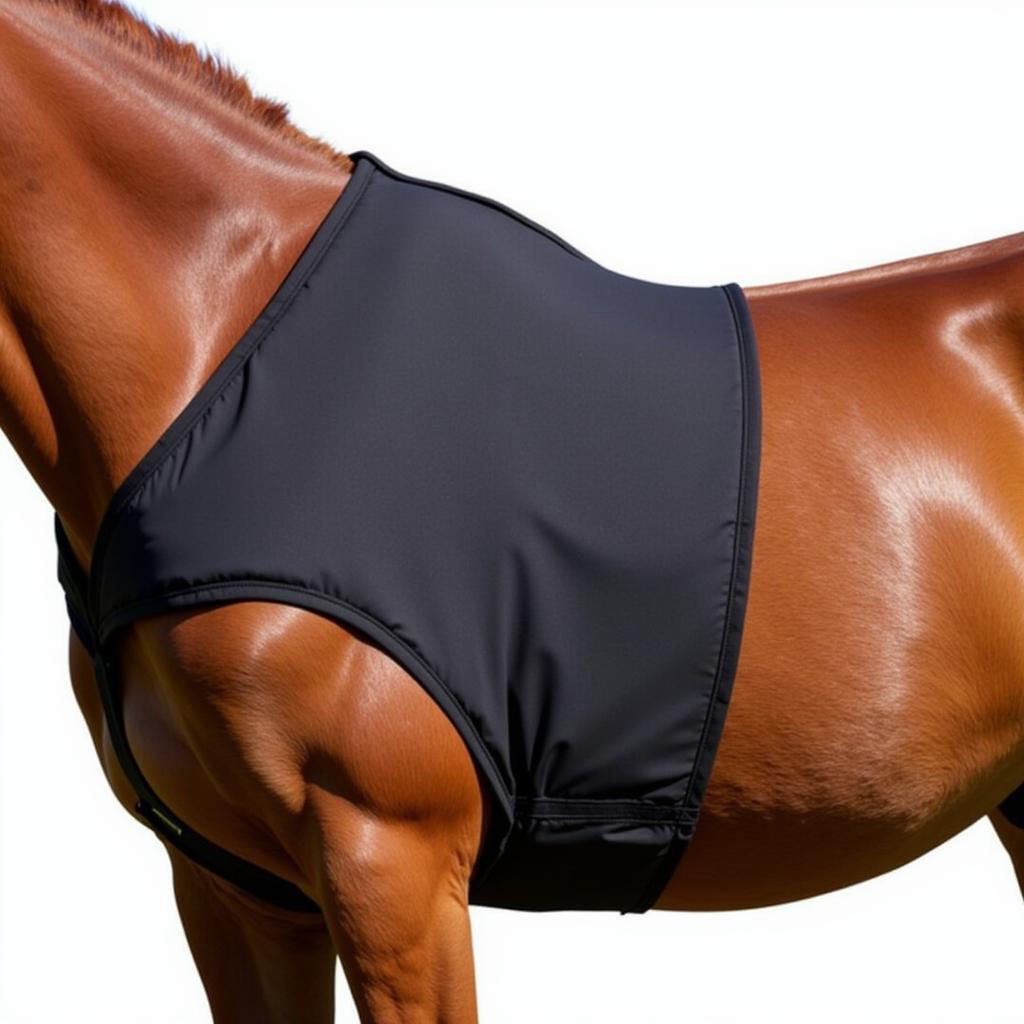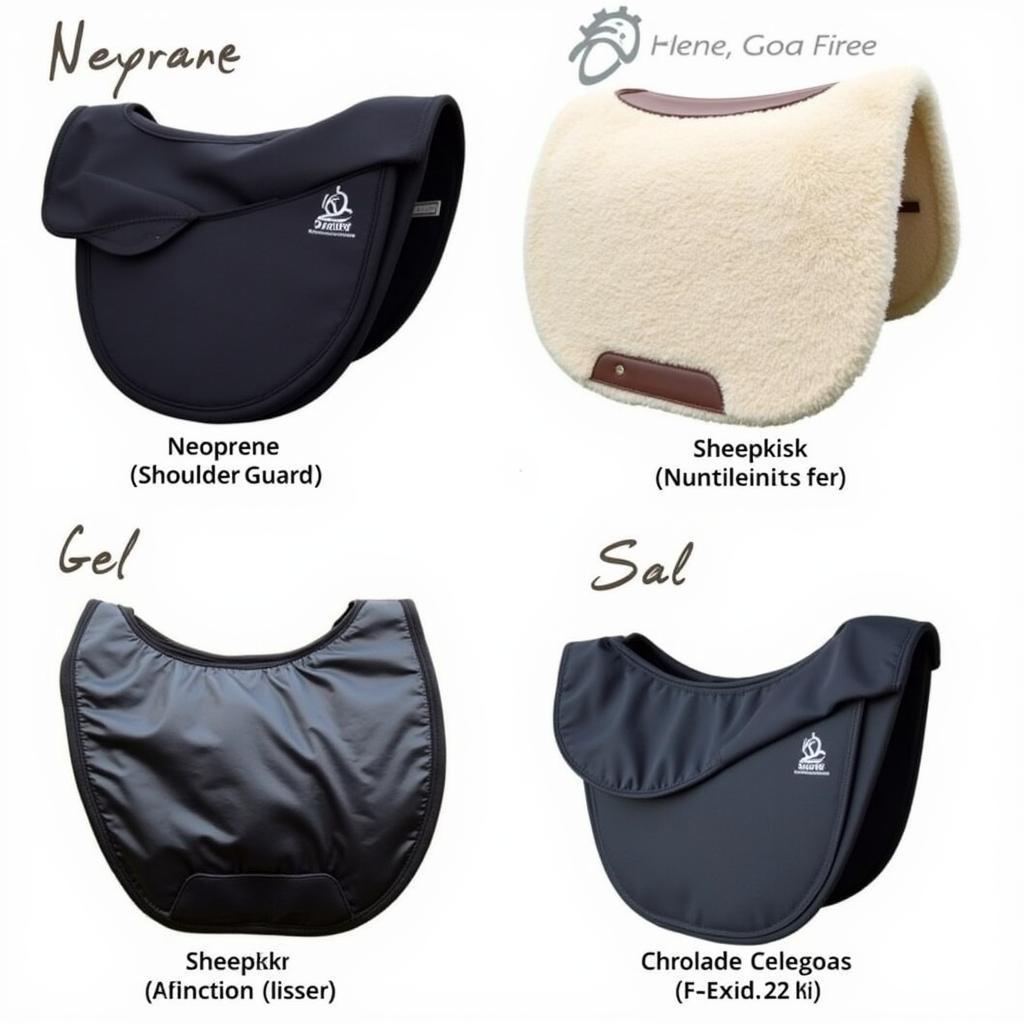A Shoulder Guard For Horses, also known as a shoulder protector, is an important piece of equipment designed to prevent sores, rubs, and chafing caused by saddles, girths, or other tack. Especially crucial for horses in active training or competition, shoulder guards provide a protective barrier between the horse’s delicate skin and potential irritants.
 Horse Wearing Shoulder Guard
Horse Wearing Shoulder Guard
Why Use a Shoulder Guard for Horses?
Horses, particularly those engaged in strenuous activities, are prone to developing sores and rubs in the sensitive shoulder area. The repetitive motion of the legs, combined with the pressure from the saddle and girth, can create friction and irritation. Shoulder guards act as a buffer, minimizing friction and preventing these painful conditions.
Here are some key benefits of using shoulder guards:
- Sore Prevention: The primary function is to prevent sores and rubs caused by saddle and girth friction.
- Enhanced Comfort: By reducing friction, shoulder guards allow for greater freedom of movement and overall comfort, which is particularly important during demanding training sessions or competitions.
- Faster Healing: For horses recovering from existing sores, a shoulder guard can provide a protective barrier, allowing the injured area to heal faster without constant irritation.
- Improved Performance: A comfortable horse is a happy horse! By preventing discomfort, shoulder guards can contribute to improved performance and focus during training and competition.
Types of Shoulder Guards for Horses
There is a wide array of shoulder guards available, each offering unique features and benefits:
- Neoprene Shoulder Guards: These are popular for their shock-absorbing and water-resistant properties. Neoprene conforms to the horse’s body, providing a snug fit and excellent protection.
- Sheepskin Shoulder Guards: Known for their natural breathability and moisture-wicking properties, sheepskin shoulder guards are a comfortable option, especially for horses with sensitive skin.
- Gel Shoulder Guards: Designed for maximum impact absorption and pressure distribution, gel shoulder guards are ideal for horses involved in high-impact disciplines.
- Combination Shoulder Guards: Some guards combine materials like neoprene and sheepskin to offer the best of both worlds, providing both protection and comfort.
Choosing the Right Shoulder Guard for Your Horse
Selecting the appropriate shoulder guard depends on your horse’s individual needs and the type of activities they participate in:
- Size and Fit: Ensure a proper fit. The shoulder guard should sit comfortably without restricting movement. Measure your horse carefully, referring to the manufacturer’s sizing chart.
- Material: Choose a material based on your horse’s needs and sensitivities. Neoprene is versatile, sheepskin is breathable, and gel offers maximum impact absorption.
- Discipline: Consider the specific demands of your chosen discipline. High-impact activities might necessitate a more robust guard like a gel option.
- Severity of Issue: For horses prone to severe sores or recovering from injuries, a more substantial guard with additional padding might be necessary.
 Different Types of Horse Shoulder Guards
Different Types of Horse Shoulder Guards
Tips for Using a Shoulder Guard for Horses
- Introduce Gradually: If your horse is not used to wearing a shoulder guard, introduce it gradually during short periods to allow for acclimation.
- Check Fit Regularly: Ensure the shoulder guard maintains a proper fit over time, especially as your horse’s muscle mass changes.
- Clean Regularly: Follow the manufacturer’s cleaning instructions to prevent the buildup of dirt, sweat, and bacteria. A clean shoulder guard is essential for maintaining hygiene and preventing skin irritation.
Conclusion
Investing in a high-quality shoulder guard is a proactive step in safeguarding your horse’s well-being. By preventing sores, rubs, and discomfort, shoulder guards contribute to a more comfortable and enjoyable riding experience for both horse and rider. Remember to choose a shoulder guard that meets your horse’s individual needs and consult with your veterinarian or equine professional for personalized advice.
FAQs
Q: How do I know if my horse needs a shoulder guard?
A: Signs your horse might benefit from a shoulder guard include resistance to saddling, sensitivity in the shoulder area, visible sores or rubs, and changes in performance or behavior under saddle.
Q: Can I use a shoulder guard on a horse with existing sores?
A: It’s best to consult your veterinarian before using a shoulder guard on a horse with existing sores. They can assess the severity of the issue and recommend the most appropriate course of action.
Q: How often should I clean my horse’s shoulder guard?
A: Cleaning frequency depends on usage and environmental conditions. As a general rule, cleaning the shoulder guard after every few rides or whenever it gets excessively dirty or sweaty is recommended.
Need Help? Contact Justus Horses USA
For personalized advice on choosing the right shoulder guard for your equine partner, contact Justus Horses USA. Our dedicated team is here to assist you.
Call: 0772127271
Email: [email protected]
Visit: QGM2+WX2, Vị Trung, Vị Thuỷ, Hậu Giang, Việt Nam
Our customer support team is available 24/7 to answer your questions and provide expert guidance.